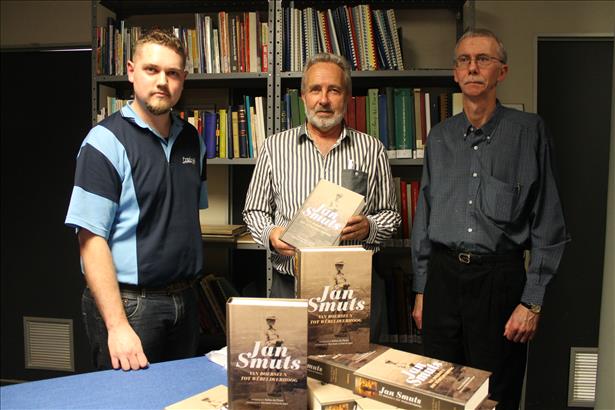Latest News Archive
Please select Category, Year, and then Month to display items
28 June 2022
|
Story Nonsindiso Qwabe
|
Photo ALBERT VAN BILJON
 In conversation: Prof Petersen and Leanne Manas.
In conversation: Prof Petersen and Leanne Manas.
An outward-looking, globally competitive university that ranks among the top-tier universities in South Africa and on the continent, driven by a strong human-centred, diverse social-justice approach. This is at the heart of the vision
Prof Francis Petersen, Rector and Vice-Chancellor of the UFS, shared with multi-award-winning
news anchor
Leanne Manas during a sit-down conversation on Friday 22 July 2022.
Prof Petersen reflected on the great strides and difficulties faced during his first term, as well as navigating the UFS through the COVID-19 pandemic to position the institution in a strategic and focused manner as a university of choice on the continent
and in other parts of the globe.
 Prof Prakash Naidoo, Vice-Rector: Operations, introduced Leanne Manas
Prof Prakash Naidoo, Vice-Rector: Operations, introduced Leanne Manas
 Prof Francis Petersen
Prof Francis Petersen
 Leanne Manas and Prof Petersen In conversation
Leanne Manas and Prof Petersen In conversation
 Leanne Manas
Leanne Manas
 Leanne Manas meeting our staff members.
Leanne Manas meeting our staff members.
 Leanne Manas meeting our staff members.
Leanne Manas meeting our staff members.
 Leanne Manas meeting our staff members.
Leanne Manas meeting our staff members.
 Prof Petersen with some of our staff members
Prof Petersen with some of our staff members
 From the left; Prof Prakash Naidoo, Leanne Manas, Prof Francis Petersen and Temba Hlasho, Executive Director: Student Affairs
From the left; Prof Prakash Naidoo, Leanne Manas, Prof Francis Petersen and Temba Hlasho, Executive Director: Student Affairs
 Leanne Manas meeting our staff members.
Leanne Manas meeting our staff members.
 From the left; Prof Prakash Naidoo, Prof Francis Petersen and Quinton Koetaan, Senior Director; HRA
From the left; Prof Prakash Naidoo, Prof Francis Petersen and Quinton Koetaan, Senior Director; HRA
 Leanne Manas meeting our staff members.
Leanne Manas meeting our staff members.
Jan Smuts: from country boy to world stage; a reassessment
2017-11-10

At the book discussion of Jan Smuts: van boerseun tot wêreldverhoog;
'n herwaardering, were from the left: Con Robinson, Protea Bookshop;
Prof Kobus du Pisani; and Prof André Wessels from the Department
of History at the UFS.
Photo: Leonie Bolleurs
Prof André Wessels from the Department of History at the University of the Free State (UFS) was one of 20 co-authors of Jan Smuts: van boerseun tot wêreldverhoog; 'n herwaardering – a book compiled under the leadership of the general editor, Prof Kobus du Pisani, from North-West University. This unique history book deals with the different themes in the life of Smuts, rather than describing the events chronologically.
South Africans are almost afraid of their own history nowadays ... and yet another history book is being launched. Does it make sense? Yes, for two reasons.
The monster in the dark
One of the ways to overcome fear is through knowledge. The monster in the dark disappears when one understands that the street lights and tree branches are creating interesting shadows. The more one knows about something, the less scary it becomes.
The Greek Bible
This was possibly also Smuts’s approach. Knowledge was his passion, and even today he is considered as one of the best students of the University of Cambridge. Although very few people really understand his holism theory, Smuts experienced the complex world in a very simple way – as one – not as lots of different pieces functioning independently of each other.
Smuts could have made a success of any of his interest fields – law, botany, literature, and philosophy. However, politics laid three wars on his doorstep. While he is regarded as a militarist by some, he was actually a peacemaker. He played a role in the establishment of the League of Nations, and later the United Nations. Incidentally, he continued to read the Greek Bible while on commando during the Anglo-Boer War.
A colourful character
The second reason for yet another Jan Smuts history book is his fascinating humanness. Time should be spent on colourful characters such as this. It is worthwhile hearing the story of someone who had such a great impact locally and internationally – good or bad.